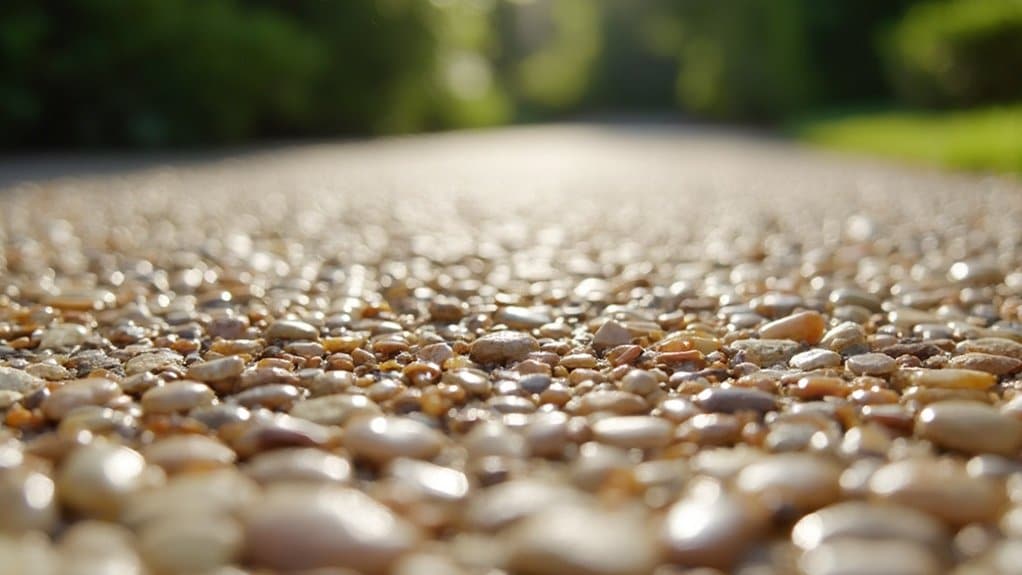Resin-bound gravel combines quality aggregate with tough resin to create a smooth, non-slip surface ideal for British driveways and garden paths. Think of it as a modern alternative to traditional gravel or concrete, offering better drainage and a smarter finish. The surface lasts upwards of 10 years with minimal upkeep – just an occasional sweep and pressure wash does the job. It meets UK sustainable drainage regulations (SuDS), helping reduce flood risk in our often-wet climate. Whether you fancy a smart new driveway or a neat garden path, resin-bound gravel offers a practical, long-lasting solution.
Key Takeaways
Resin-bound gravel pairs UV-stable resin with kiln-dried aggregate to form a smooth, hardwearing surface – perfect for British driveways and garden paths.
The permeable nature means rainwater drains straight through, preventing those annoying puddles we often see on concrete drives, whilst meeting UK sustainable drainage regulations (SuDS).
Its non-slip finish proves invaluable during our wet winters, and you can choose from various stone colours to match your property – from classic Cotswold buff to contemporary slate grey.
Getting it right means proper groundwork. You'll need a solid sub-base (much like preparing for block paving), and the resin-aggregate mix must be spot-on for the best results.
Keep it tip-top with an annual power wash and fresh seal every few years, and your resin drive should last well over a decade. Think of it as similar maintenance to looking after a wooden deck, just less frequent.
Understanding Resin-Bound Gravel
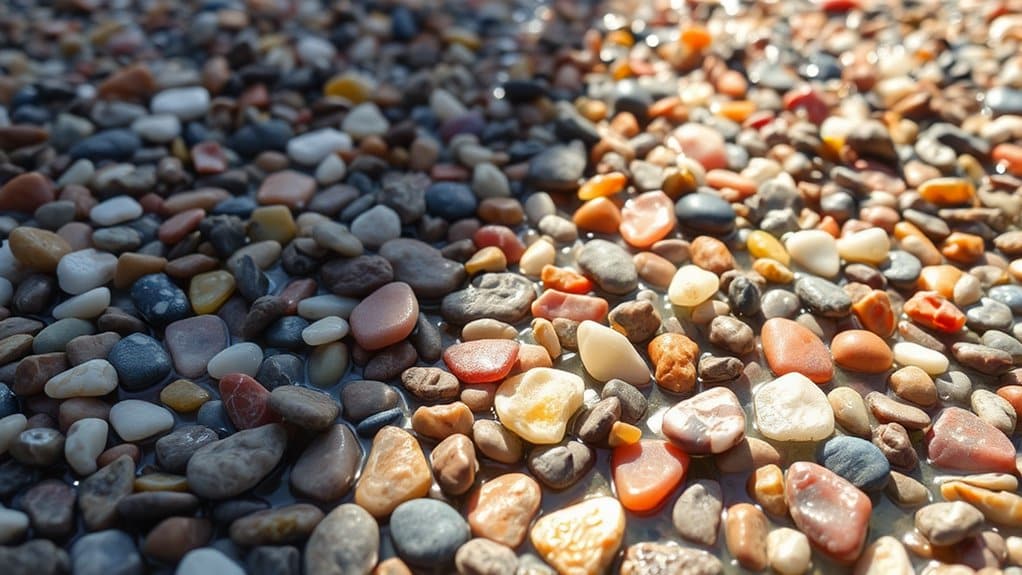
Resin-bound gravel offers a smart solution for driveways and paths, mixing UV-resistant resin with dried stones to create a smooth, lasting surface.
The system uses tough polyurethane or epoxy resins that grip firmly to stones like marble or quarried aggregate, giving you plenty of colour and texture choices. Laying the surface is straightforward – the resin and stone mix goes directly onto a proper base, typically tarmac or concrete. Its durable surface provides excellent slip resistance, making it a safe choice for high foot traffic areas.
What makes it particularly useful for British weather is its permeability; water drains right through rather than forming puddles, achieving permeability rates of up to 95% and ticking the box for modern drainage requirements (SuDS).
Perfect for driveways, garden paths and patios, this surface stays neat and accessible while handling our varied climate.
Think of it as a more sophisticated alternative to loose gravel, without the mess of scattered stones or rutted surfaces you might get with traditional options.
Benefits of Resin-Bound Gravel
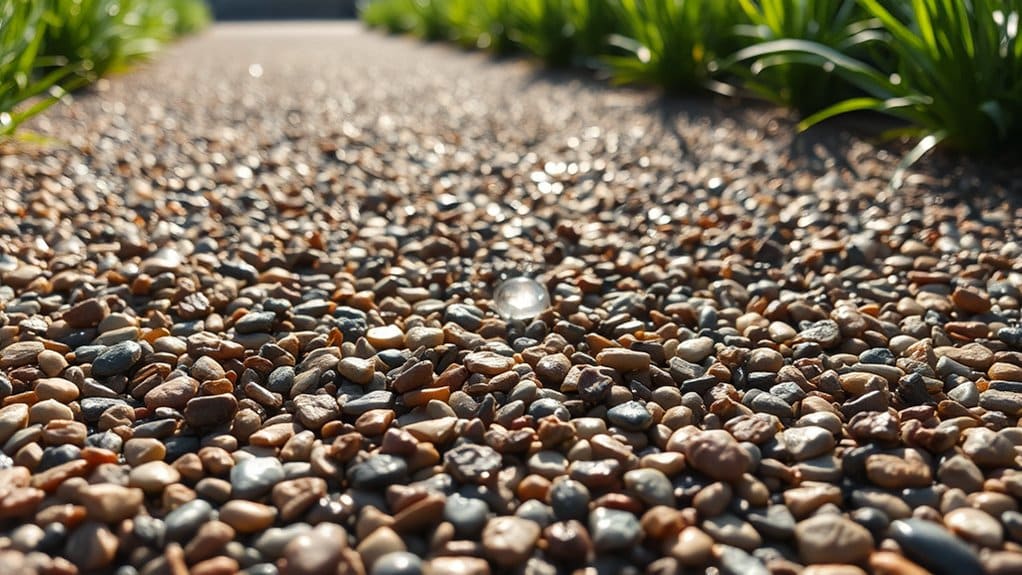
Resin-bound gravel offers clear advantages for driveways and paths in British homes. Its porous surface handles our rainy weather brilliantly, letting water drain through rather than forming puddles or ice patches in winter. This is due to its permeable surface, which allows water to drain at a rate of 850 L per square meter per minute. Additionally, its permeability rates can reach up to 95%, making it an effective solution for managing water drainage.
Built to withstand Britain's varied climate, it typically lasts well over ten years with little upkeep needed – just an occasional sweep and clean.
You can mix and match stone colours and sizes to suit your property, whether it's a modern new-build or period home. Think warm buff tones for cottages or sleek grey blends for contemporary houses.
The non-slip surface proves particularly practical for both toddlers finding their feet and older folk who need sure footing, especially in wet conditions.
For UK homeowners seeking a practical yet stylish surface, resin-bound gravel ticks all the boxes: durable, low-maintenance and visually appealing.
Preparation for Installation
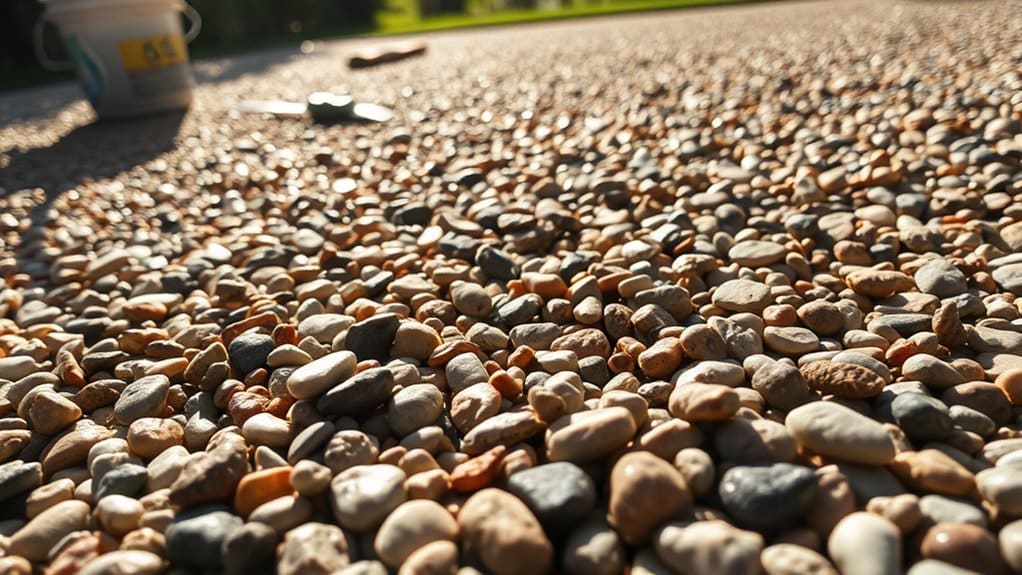
A solid sub-base is crucial for your resin-bound surface. Choose material that provides both stability and proper drainage. Proper sub-base materials will help ensure the longevity of your installation. Install robust edging to contain the gravel and maintain the area's shape. These basic steps ensure your surface stays level and long-lasting.
Selecting Suitable Sub-Base
A proper sub-base is crucial for resin-bound gravel installations across the UK, much like foundations are to a house. MOT Type 3 hardcore remains the go-to choice, offering excellent drainage and weight distribution.
For busy areas like driveways, tarmac or concrete sub-bases work best. Before laying any new surface, clear existing materials and dig to the correct depth, ensuring thorough compaction.
Grid systems provide a lighter alternative whilst maintaining good drainage. Adding a geotextile membrane helps prevent weeds and strengthens the foundation. Think of the sub-base as the unseen hero – get it right, and your resin-bound surface will serve you well for years to come.
For domestic projects, such as garden paths, a 150mm sub-base depth usually suffices, whilst driveways need at least 200mm to handle vehicle weight. Local building regulations may vary, so it's worth checking with your council before starting work.
Proper Edging Installation Techniques
Proper Edging Installation Techniques
A well-fitted edging system serves as the foundation for any quality resin-bound gravel surface. Select durable materials such as aluminium or PVC for long-lasting results. Ensure edges connect snugly to prevent unwanted debris build-up. Proper taping or sheeting of edges prevents unsightly resin staining during the laying process.
Essential Installation Steps:
| Technique | Description |
|---|---|
| Secure Fixing | Fix edges firmly to avoid shifting |
| Pre-Installation Checks | Check base levelness before fitting edges |
| Post-Installation Inspection | Check alignment with resin surface |
Before proceeding, check existing edges thoroughly to ensure they'll properly support your new surface. Much like building a sturdy garden wall, precise edge installation creates the perfect framework for your finished project.
Installation Process Overview
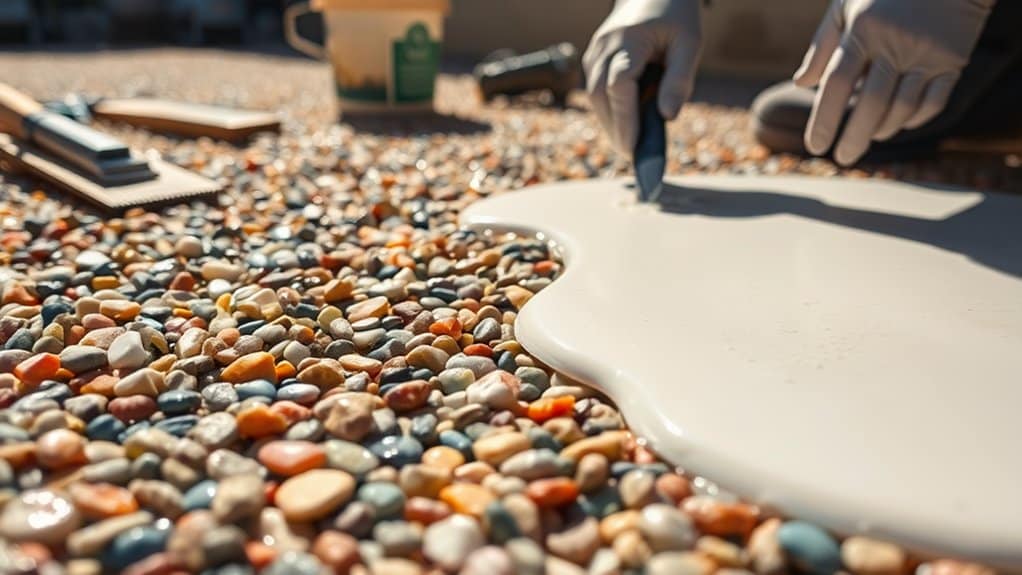
Installing resin-bound gravel requires careful attention to several key steps to achieve the best results.
Start by checking your base – it needs to be solid concrete or well-compacted Type 3 aggregate. Give it a proper clean and sort out any holes with primer where needed.
Choose UV-stable resin and suitable stones for your mix, making sure to follow the correct ratios. You'll want a forced action mixer to blend everything properly – stick to what the manufacturer recommends.
Once it's mixed, pour it out and spread it evenly across your prepared surface.
Let it set for 24-48 hours, and keep vehicles and heavy foot traffic off it for at least 72 hours. Getting these basics right, particularly the installation and curing time, will make all the difference to how long your surface lasts.
The finished product should give you a smart, durable driveway or path that'll stand up to British weather whilst looking brilliant.
Types of Resin Used in Gravel
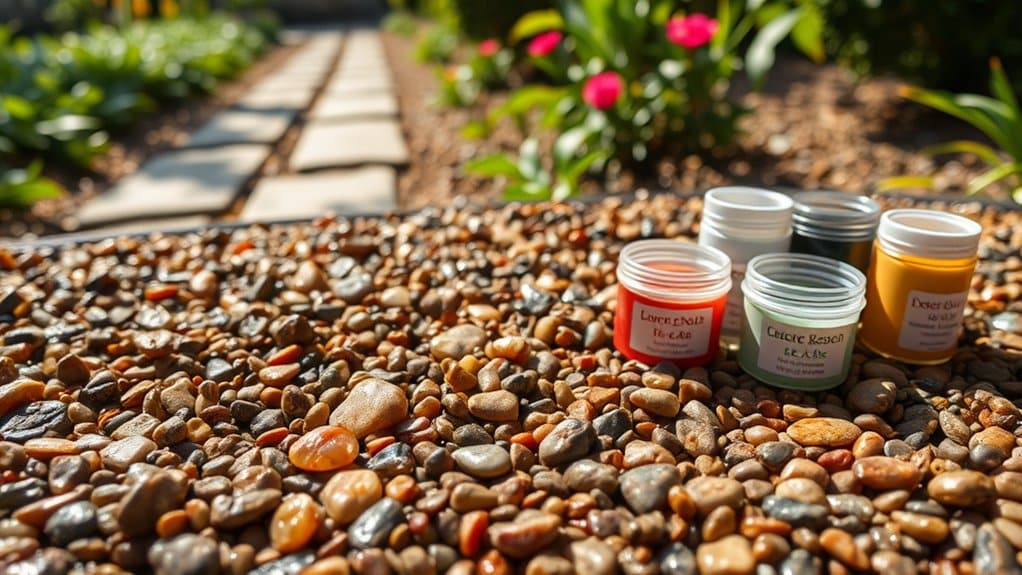
Choosing the right resin for gravel surfaces makes all the difference in durability and looks. Two main types dominate the UK market: polyurethane and epoxy resins.
Polyurethane resins offer excellent flexibility and won't fade in our British weather, keeping your driveway or garden path looking fresh. Think of it like a good raincoat – flexible and weather-resistant.
Epoxy resins, whilst incredibly strong, can yellow over time when exposed to sunlight. They're brilliant for indoor spaces or shaded areas, much like how you'd use different paints for interior and exterior walls.
For typical British weather conditions, opt for permeable systems that let rainwater drain through, preventing those annoying puddles on your drive.
If budget is tight, non-UV stable options work well for covered areas.
The finish can be smooth or textured – rather like choosing between matt or glossy tiles. Your choice should match both practical needs and style preferences.
Cost and Longevity Considerations
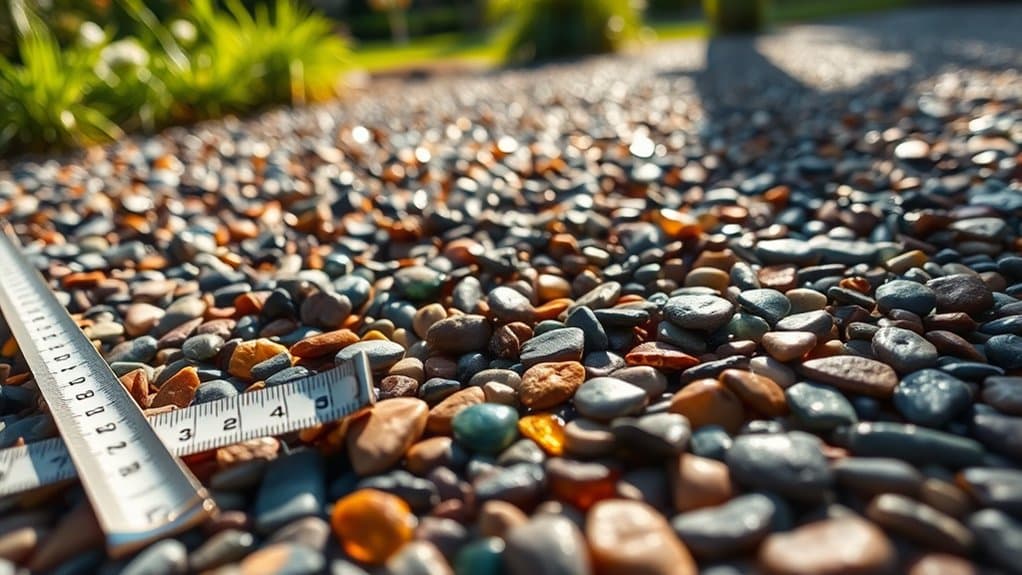
The cost and lifespan of resin-bound gravel deserve careful consideration. Material costs range from £30-£70 per square metre, varying by resin quality and chosen stones.
While DIY installation might tempt some, professional fitting (around £40-£60 per square metre) ensures proper results and longevity.
A well-installed resin driveway typically lasts 15-20 years, far outlasting loose gravel that needs frequent topping up.
Though pricier upfront than traditional gravel (which might cost £20-£30 per square metre installed), resin-bound surfaces need little maintenance beyond occasional brushing and pressure washing.
The investment makes sense when you consider the practical benefits: no more gravel migration, no weeding, and a surface that stays smart-looking year after year.
Plus, it often adds value to your property, particularly important in areas where kerb appeal matters.
Like any home improvement, quality materials and proper installation are key – cutting corners on either could mean replacing the surface years earlier than necessary.
Environmental Impact and Compliance
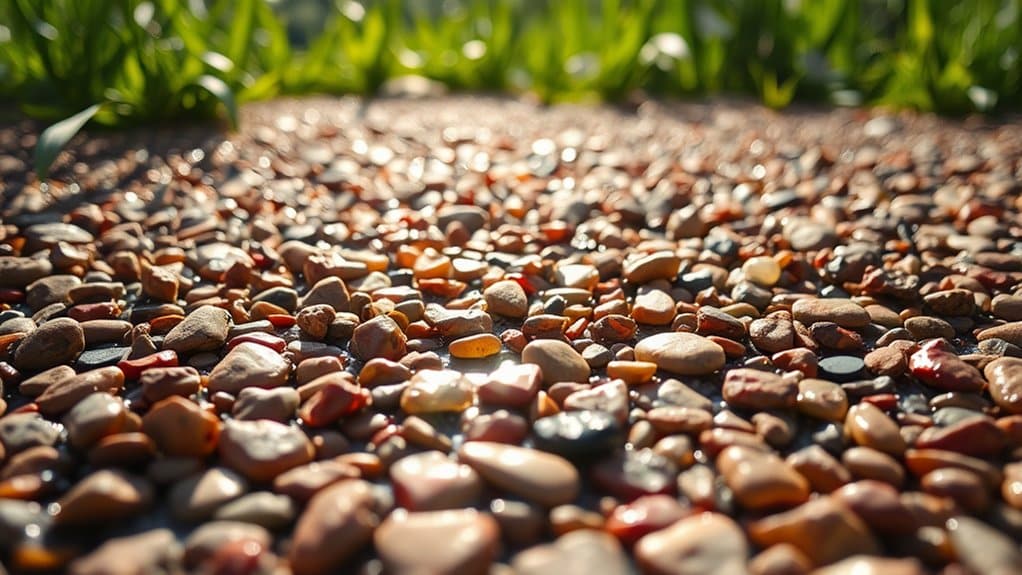
Resin-bound gravel meets Sustainable Urban Drainage System (SuDS) requirements in the UK, allowing rainwater to drain naturally through the surface.
The system offers environmentally sound options, including recycled stone aggregates, making it a responsible choice for British homeowners and developers.
This sustainable surfacing helps reduce flood risks whilst supporting local planning regulations.
SuDS Compliance Benefits
SuDS Compliance Benefits
Resin-bound gravel meets Sustainable Urban Drainage Systems (SuDS) requirements whilst delivering key environmental advantages for UK properties:
- Reduces surface water runoff – prevents localised flooding, particularly crucial during heavy British rainfall.
- Supports natural groundwater recharge – maintains healthy soil conditions and plant life in your garden.
- Enhances water quality – filters out common pollutants like oil and petrol before they enter local waterways.
- Reduces pressure on drainage systems – particularly valuable in urban areas where Victorian drains often struggle with capacity.
Choosing resin-bound gravel ensures SuDS compliance whilst protecting your property and the local environment.
Think of it as a practical investment that manages rainwater naturally, much like a well-designed garden border or lawn.
Eco-Friendly Material Options
Eco-friendly resin-bound gravel doesn't mean compromising on quality. Several sustainable options now exist in the UK market, including recycled aggregates from construction waste and local sources, which cut down on transport emissions and landfill use.
Non-toxic resins are becoming standard practice, offering better air quality during installation whilst maintaining durability. These materials work brilliantly with SuDS requirements – water flows through easily, helping prevent localised flooding and naturally topping up groundwater levels.
Top sustainable choices include:
- Recycled glass aggregates
- Crushed concrete from demolition sites
- Local stone and gravel
- Plant-based resins
These green alternatives often cost about the same as traditional materials but deliver far better environmental benefits. When paired with proper installation, they'll last just as long as standard options whilst helping meet UK sustainability targets.
Maintenance and Care Tips
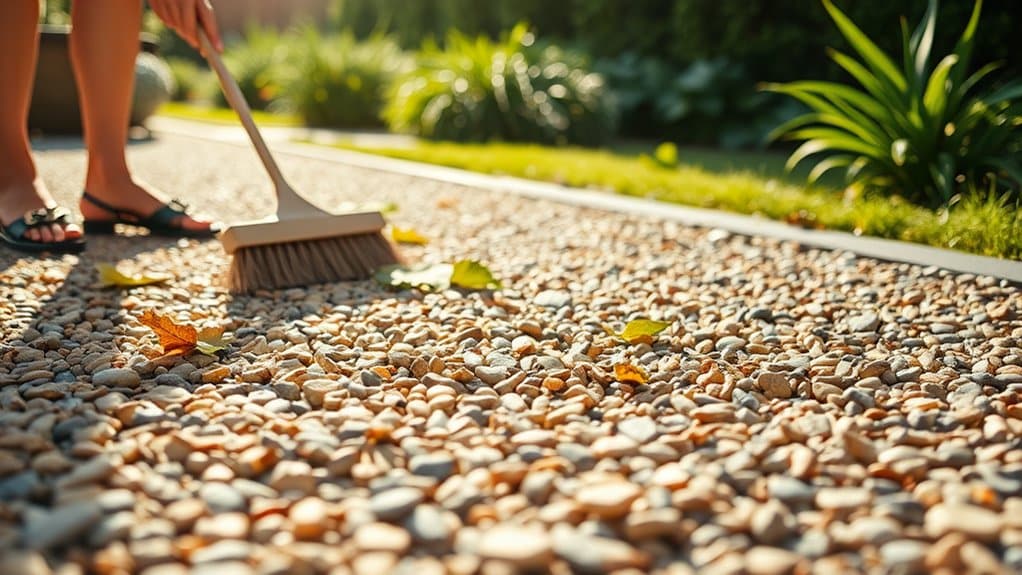
Maintenance and Care Tips
Regular maintenance keeps your resin-bound gravel looking smart whilst protecting your investment. Simple monthly checks and cleaning will ensure your surface stays pristine for years.
Key care points:
- Regular cleaning – Use a soft brush or leaf blower to clear fallen leaves and dirt.
- Weed control – Pull out any weeds by hand or treat with weedkiller to protect the surface.
- Check for damage – Look for cracks or loose spots during routine cleaning.
- Reseal – Apply new sealant every 2-3 years to maintain protection.
Clean with mild soap and water, avoiding high-pressure washers which might damage the surface.
Quick action on repairs prevents small issues from becoming costly problems.
Frequently Asked Questions
Can Resin-Bound Gravel Be Installed in Cold Weather?
Installing resin-bound gravel during cold spells isn't advisable, as chilly temperatures interfere with proper resin curing. For best results, lay the surface when it's between 5°C and 25°C – think spring or autumn days rather than winter months. Anything colder risks poor adhesion and a weakened surface that won't stand the test of time.
Is Resin-Bound Gravel Suitable for Pedestrian Walkways?
Resin-bound gravel works brilliantly for pedestrian walkways. Its non-slip surface keeps walkers safe, even in typical British wet weather. Think of it like a pathway you'd find at a modern National Trust property – smart-looking yet practical. When laid properly, it's tough as nails and needs little upkeep. The surface lets rainwater drain through nicely, preventing those annoying puddles we're all too familiar with in the UK.
How Do I Choose the Right Color for My Project?
Colour influences 85% of buying decisions in the UK. When selecting colours for your project, focus on two key factors: the psychological impact of different shades and how well they work together. For instance, blue conveys trust (think NHS and bank logos), whilst red grabs attention (like sale signs and traffic lights). Consider your project's purpose – whether it's a calming bedroom makeover or an eye-catching marketing campaign – and choose colours that support your goals.
Can I Install Resin-Bound Gravel Over Existing Surfaces?
Resin-bound gravel cannot be laid over dodgy surfaces. Sort the base properly first – get rid of crumbling bits, ensure it's rock-solid, and check the water can drain away properly. Think of it like laying patio slabs – a proper foundation means your new surface will last for years to come.
What Is the Lifespan of Resin-Bound Gravel?
Resin-bound gravel typically lasts between 20-30 years when properly installed using quality materials. Much like a well-maintained garden path, its longevity depends on the calibre of resin used and professional fitting. Regular upkeep, including seasonal cleaning and prompt repairs to any cracks, keeps the surface looking fresh and performing well throughout its life.
Conclusion
Resin-bound gravel delivers a hard-wearing, smart-looking surface that needs minimal upkeep. Like a proper Sunday roast where quality ingredients make all the difference, successful resin-bound gravel relies on correct materials and installation. Follow the recommended fitting guidelines and basic maintenance, and you'll have a reliable surface that serves your property well for years to come.
